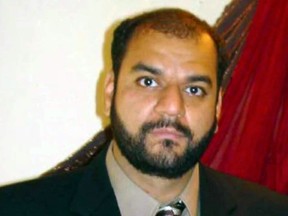The Issues: Parole for Plotting Violent Jihadist Attack: Current Risk to Society
"You voluntarily engaged in actions that could have resulted in the death of dozens of people. You have chosen terrorism to target human rights, democracy and the rule of law. By your acts, you have threatened the dignity and security of human beings.""You acknowledge your responsibility for the crimes you committed, although you tend to minimize your responsibility and to be defensive when your actions are questioned.""Since your return to the community, you have demonstrated a willingness to avoid using violence and forcing your ideas in your exchanges.""You do not express any deep commitment to an extremist ideology .. you do not demonstrate strong and pervasive political views likely to have an impact on risk.""You wanted to be considered by the Muslim community as a hero who stopped the war in Iraq.""Given your overall progress, your CMT [case management team] is of the opinion that your release plan is realistic, structured, gradual and can be endorsed because it currently contains the necessary steps to achieve your objectives.""After a careful analysis of your case, the board grants you full parole. It is the board's opinion that you will not present an undue risk to society if released on full parole."Parole Board of Canada -- June 28, 2023
 |
In
their great wisdom the Parole Board of Canada decided that 'an undue
risk avoidance' is manageable for this 47-year-old Muslim-Canadian whose
deep resentment against Canada for engaging with its peer nations in
the joint effort to contain the deadly violence threatened and carried
out by extreme Islamist groups, justified plotting against the country
in a determined strategy to wreak havoc and death as divine punishment. A
more prosaic, preventive punishment was meted out to Shareef
Abdelhaleem, a software engineer who transformed himself into a
vengeance-dealing jihadist.
He
was sentenced to life in prison after a jury found him guilty of a plot
to detonate truck bombs in and around Toronto, to storm Parliament in
Ottawa, to take hostages and to behead the prime minister in the
infamous Toronto 18 terrorist plot of 2006. A young Muslim man had
volunteered to infiltrate the jihadist plot group and to gather evidence
for the investigating RCMP, a move that helped investigators to gather
the evidence required to round up the plotters and bring them to justice
before any of their plans saw action.
Now,
according to the parole board, this man has made satisfactory progress
in rehabilitation, rejects extremist ideology, attended deradicalization
programs and is prepared to reintegrate into society. He has enrolled
in a college course and there has gained good grades. The Government of
Quebec has been paying him financial assistance of $650 weekly. In
another year and a half his courses will be complete, it seems. He will
graduate and become independent of social assistance.
On
parole, he is enjoined by two conditions imposed, not to be in a
position of responsibility or leadership in any spiritual or religious
activities or groups who share the same beliefs; and he is not to
associate or communicate with anyone he knows or has reason to believe
is involved in criminal activity or radicalized activity. Taqiyya -- (literally "prudence, fear") is a precautionary dissimulation or denial of religious belief and practice...
Arrested
in 2006, Abdelhaleem was convicted in 2011, granted day parole in 2021,
and graduated to living in a Quebec halfway house. His day parole was
extended for another three months, followed by a hearing before his
request for full parole was decided. He appeared before the parole board
on June 27 by videolink, the decision announced the day following.
Born in Egypt, his was "a typical Middle Eastern family".
His family moved around to different locations in the Middle East,
travelled to England, and then emigrated to Canada. They had permanent
resident status, and in 1993 Abdelhaleem became a Canadian citizen. A
year later he enrolled in a four-year university computer science
program but dropped out to establish a computer software business in
1995.
Attending
a mosque regularly to reconnect with his Islamic background, he met
other young Muslim men who were agitating for jihad against the West,
and was attracted to their radicalized terror plots. A recent
psychological assessment found his risk of general violence was reduced
to low, noting positive progress since his release on day parole and
making note of his acceptance of democratic values.
Notable: in a previous assessment, his case management team advised against his release.
"It was the opinion of the Board that the seriousness of your actions and their potentially devastating nature called for caution.""The Board concludes that you will present an undue risk to society and your release will not contribute to the protection of society by facilitating your reintegration into society as a law-abiding citizen on full parole."Parole Board of Canada, September 14, 2022
"Abdelhaleem talked about fleeing the country 15 days before the attack [perhaps to his sister’s house in Cleveland] in order to avoid suspicion. In the next, he talked about being sentenced to ten years at Kingston Penitentiary, where he will be considered a leader by other Muslim inmates. He also explained to me that when he thinks about being arrested, it is only after the fact, after the bombings. He never imagined that the arrests would happen before the bombs were detonated." "Abdelhaleem relished in the carnage they would cause. One of the three selected targets, the CSIS headquarters in downtown Toronto, 'will be affected from the main floor to the top floor', Abdelhaleem said. 'There will be blood, glass and debris everywhere.' In his words, the attack will be dubbed 'The Battle of Toronto'."Informant's testimony at Abdelhaleem trial
 |
| Shareef Abdelhaleem watches as a Crown attorney questions a witness during a Toronto 18 trial in 2010. |
Labels: Canadian Citizens, Full Parole, Islamist Jihad, Planned Large-Scale Violence, Sentence of Life Imprisonment

<< Home